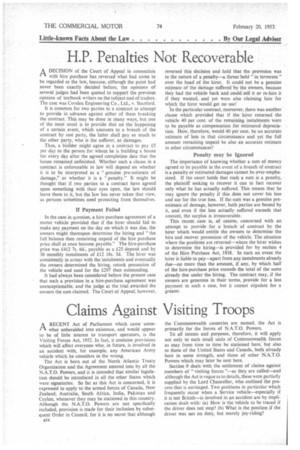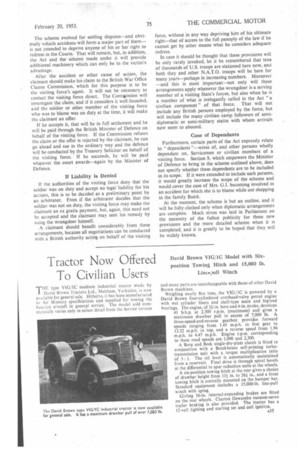Claims Against Visiting Troops
Page 50

Page 53

If you've noticed an error in this article please click here to report it so we can fix it.
A RECENT Act of Parliament which came somewhat unheralded into existence, and would appear to be of little interest to transport operators, is the Visiting Forces Act, 1952. In fact, it contains provisions which will affect everyone who, in future, is involved in an accident with, for example, any American Army vehicle which he considers in the wrong.
The Act is born out of the North Atlantic Treaty Organization and the Agreement entered into by all the N.A.T.O. Powers, and it is intended that similar legislation should be introduced in all the other States which were signatories. So far as this Act is concerned, it is expressed to apply to the armed forces of Canada, New Zealand, Australia, South Africa, India, Pakistan and Ceylon, whenever they may be stationed in this country. Although the N.A.T.O. Powers are not specifically included, provision is made for their inclusion by subsequent Order in Council, for it is no secret that although 016 the Commonwealth countries are named, the Act is primarily for the forces of N.A.T.O. Powers.
To all intents and purposes, therefore, it will apply not only to such small units of Commonwealth forces as may from time to time be stationed here, but also to those of the United States and Canada, both already here in some strength, and those of other N.A.T.O. Powers which may later be sent here.
Section 9 deals with the settlement of claims against members of "visiting forces "—as they are called—and although the Act is vague as to details, these were partially supplied by the Lord Chancellor, who outlined the process that is envisaged. Two problems in particular which frequently occur when a Service vehicle—especially if it is not British—is involved in an accident are by implication dealt with: (a) How is the vehicle to be traced if the driver does not stop? (b) What is the position if the driver was not on duty, but merely joy-riding? The scheme evolved for settling disputes—and obviously vehicle accidents will form a major part of them— is not intended to deprive anyone of his or her right to redress in the Courts. That will remain, but, in addition, the Act and the scheme made under it will provide additional machinery which can only be to the victim's advantage.
After the accident or other cause of action, the claimant should make his claim to the British War Office Claims Commission, which for this purpose is to be the visiting force's agent. It will not be necessary to contact the visiting force direct. The Comigission will investigate the claim, and if it considers it well-founded, and the soldier or other member of the visiting force who was to blame was on duty at the time, it will make the claimant an offer.
If he accepts it, that will be in full settlement and he will be paid through the British Minister of Defence on behalf of the visiting force. If the Commission refuses the claim or the offer is rejected by the claimant, he cart go ahead and sue in the ordinary way and the defence will be conducted by the Treasury Solicitor on behalf of the visiting force. If he succeeds, he will be paid whatever the court awards—again by the Minister of Defence.
If Liability is Denied
If the authorities of the visiting force deny that the soldier was on duty and accept no legal liability for his actions, this is to be decided as a preliminary point by an arbitrator. Even if the arbitrator decides that the soldier was not on duty, the visiting force may make the claimant an ex gratia payment, but, again, this need not be accepted and the claimant may seek his remedy by suing the Wrongdoer himself.
A claimant should benefit considerably from these arrangements, because all negotiations can be conducted with a British authority acting on behalf of the visiting force, without in any way depriving him of his ultimate right—that of access to the full panoply of the law if he cannot get by other means what he considers adequate• redress.
In case it should be thought that these provisions will be only rarely invoked, let it be remembered that tens of thousands of U.S. troops are stationed here now, and both they and other N.A.T.O. troops will be here for many years—perhaps in increasing numbers. Moreover —and this is most important—not only will these arrangements apply whenever the wrongdoer is a serving member of a.visiting State's forces, but also when he is a member of what is inelegantly called in the Act "a civilian component" of that force. That will not include any British persons employed by the force, but will include the many civilian camp followers of semidiplomatic or semi-military status with whom arrivals now seem to abound.
Case of Dependants
Furthermore, certain parts of the Act expressly relate to "dependants "—wives of, and other persons wholly dependant on, Servicemen or civilian members of a visiting force, Section 9, which empowers the Minister of Defence to bring' in the scheme outlined above, does not specify whether these dependants are to be included in its scope. If it were extended to include such persons, it would greatly increase the scope of the scheme and would cover the case of Mrs. G.I. becoming involved in an accident for which she is to blame while out shopping in the family Buick.
. At the moment, the scheme is but an outline, and it will be fully clothed only when diplomatic arrangements are complete. Much stress was laid in Parliament on the necessity of the fullest publicity for these new provisions and the more detailed scheme when it is completed, and it is greatly to be hoped that they will be widely known.




















































































